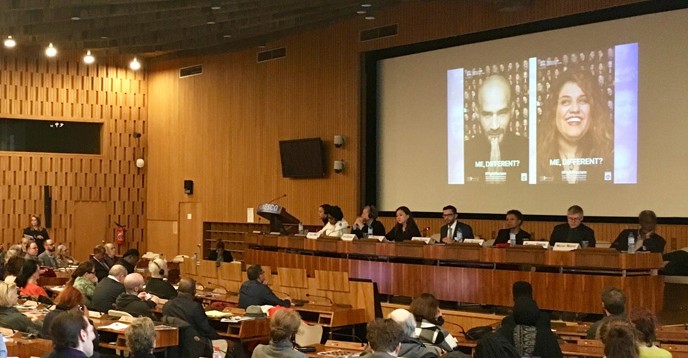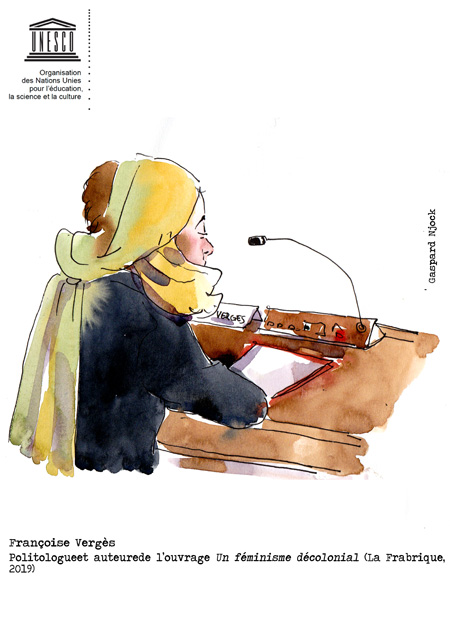
Breaking free from racial representations and the legacies of slavery
infocus_roundtable_racism2019.jpg

Deconstruct the concept of race and analyze racial representations inherited from slavery were at the centre of discussions at UNESCO Headquarters in Paris on the occasion of the International Day for the Elimination of Racial Discrimination, celebrated on 21 March. The round table "Slavery, Race and Racism: How to break free from racial representations?” brought together experts on racism and the legacies of slavery and colonization to exchange their analysis of the roots of racism, the perpetuation of racial prejudice and the persistence of biased representations.
In her opening speech, Ângela Melo, UNESCO’s Director of Policies and Programmes at the Social and Human Sciences Sector, affirmed the concept of race is complex to understand, and is a social construction that has long been used to justify statements and reports of domination which mask a disconcerting reality about slavery and colonialism. “It is all the more essential to combat this phenomenon, which justifies racial discrimination and is intensified in a context of fear of the ‘other’ and withdrawal into our current societies”, she said.
The anthropologist Alan Goodman argued the belief that races are biogenetic, natural, and hierarchically ranked is “fake science”. “Science is essential to dismantling racism. Engaging with science of human biological variation is necessary to effectively and completely eliminate the ideology of racism”, said Goodman who is a professor at the University of Massachusetts Amherst and founder of the travelling exhibition Understanding Race. “Racism is both morally and scientifically wrong”, he added.
Patrick Simon, Director of Research at the French National Institute of Demographic Studies (INED), said although the scientific base of racism has been defeated, generalized racial categorization is yet to be dismantled. In this context, it is crucial that societies explore how to become “post-racial”.
“We need to reconcile the educational work and the fact that we have to raise awareness against ethnic and racial representations whilst at the same time making visible the mechanisms of ordinary daily discrimination in order to change them in all practices having to do with the organization of society”, he observed.

The historian Nell Irvin Painter, author of The History of White People, discussed the issue of categorizing population according to race. “What is needed is a focus on equality, diversity and inclusion in which social dynamics are more important than categories”, she argued.

For Mactar Ndoye, representative of the Office of the United Nations High Commissioner for Human Rights (OHCHR), evoking the International Convention on the Elimination of All Forms of Racial Discrimination (1965) is completely topical. “Very few States have launched national programmes against racism. Racism is not only concentrated in Europe and the United States, but also in the Arab world, Africa and Asia. We need a common discussion. Everybody needs to accept that racism is a universal phenomenon. At the time being, we are sliding backwards”, he alerted.

The political scientist Françoise Vergès, President of the association “Décoloniser les arts" (Decolonize the arts), highlighted the fight against racism is connected to the struggle against patriarchies and neoliberalism. “In current feminism, fighting against racism and for liberation of everybody are connected. It is difficult to convince society combating racism means deracializing societies and institutions”, she stressed.
City action
Hélène Geoffroy, Mayor of Vaulx-en-Velin (France), shared an experience of local engagement against racism. In 2014, the municipality established neighbourhood councils where dwellers could debate as peacefully as possible. The city also elaborated an action plan against racism, anti-Semitism and discrimination.
“We opened a call for tenders and asked local players to define long-term actions, including against terrorism, that could be financed by small or big budgets co-funded with the State”, she said. “On the ground, there are many reasons to be hopeful”, the Mayor added.
The commemorative event at UNESCO featured the exhibition Posters against slavery - Will we still close our eyes?, produced by the City of Saint Denis (France) in cooperation with students from the Paul Eluard high school. “To become a city for all, it was important to know each other and know our history. We had several sessions to get to know each other, share values, respect specific backgrounds and establish dialogues”, said Raphaëlle Serreau, municipal councilor of Saint Denis. On this occasion, UNESCO also presented the travelling exhibition Us and Them – From Prejudice to Racism, conceived and produced by the French National Museum of Natural History.
In the panel, Marik Fetouh, Vice-Mayor of the City of Bordeaux, member of UNESCO’s International Coalition of Inclusive and Sustainable Cities – ICCAR, presented the poster campaign in public spaces against racism and discrimination “Us, Different?”, co-organized by the City and UNESCO. “Civil society can be responsible for political issues and represents a counter-power against the extreme-right”, he said. Later during the day at the Bordeaux Town Hall, Marik Fetouh, together with Anna-Maria Majlöf, UNESCO’s Chief a.i. of the Inclusion and Rights Section of the Social and Human Sciences Sector, and Christian Gravel, Advisor at the Inter-Ministerial Delegation against Racism, anti-Semitism and LGBT hate (DILCRAH), officially launched the poster campaign in the presence of NGOs and members of the press. The campaign is being made available to all members of ICCAR.
UNESCO is mobilized in the combat against discrimination notably through its International Coalition of Inclusive and Sustainable Cities – ICCAR, which brings together more than 500 cities worldwide. At the same time, the Organization continues contributing to the understanding of the historical roots of prejudice and racism through its Slave Route Project: Resistance, Liberty, Heritage.
The role of arts
The round table also touched upon the issue of remembrance and artistic discourse on racial narratives. The historian Marcel Dorigny discussed how artists exposed the horrors of slavery and fought against it in previous centuries, despite a majority of paintings presenting ideal images of colonial times. “Artists also valorized the breaking free from slavery and denounced slave trade”, he said.
The Cameroonian cartoonist Gaspard Njock, author of Un voyage sans retour (One-way trip), advocates for drawing against racial social caricatures. “Drawing played a role in reinforcing racism and legitimizing powers in place throughout history”, he said. “Today, we use the same principle to portray current stories by empowering discriminated groups in our drawings”, added the cartoonist. During the event, he made live portrait sketches against racial cartoons.
At the same time, two of the greatest chess players of all times – the Chess World Champion Magnus Carlsen and the Grandmaster Anish Giri – teamed up within the campaign #MoveForEquality. According to chess rules, white always makes the first move. The chess players changed the rules of the game and made a move towards equality by making black move first.
Magnus Magnusson, UNESCO’s Director of Partnerships and Outreach at the Social and Human Sciences Sector, closed the event affirming the fight against racism is permanent. “We will carry on day after day until all representations and all forms of racism and discrimination are deconstructed and banished from our societies, because fighting against the persistence of our racial biases is a responsibility that we all share and should prioritize, whatever our background or occupation”, he declared.
The International Day was also marked by the social media campaign organized by the Canadian Canadian Commission for UNESCO with the cooperation of the Canadian Coalition of Municipalities Against Racism and Discrimination (CCMARD), member of ICCAR, called “Meet. Discover. Share.” using the hashtag #ItStartsWithMe.
